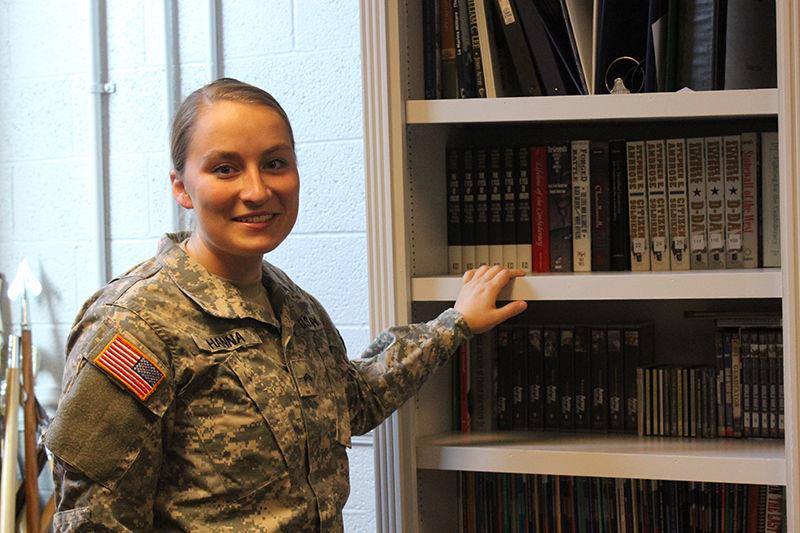 Ashley Hanna, a sophomore majoring in exploratory studies, is an Army ROTC cadet. Hanna was among the NC State cadets who were mobilized with the National Guard to provide disaster relief support for Hurricane Matthew. Hanna is a medic with the North Carolina National Guard and was stationed in Lumberton and Fair Bluff." />
Ashley Hanna, a sophomore majoring in exploratory studies, is an Army ROTC cadet. Hanna was among the NC State cadets who were mobilized with the National Guard to provide disaster relief support for Hurricane Matthew. Hanna is a medic with the North Carolina National Guard and was stationed in Lumberton and Fair Bluff." />
Will Skinner
Ashley Hanna, a sophomore majoring in exploratory studies, is an Army ROTC cadet. Hanna was among the NC State cadets who were mobilized with the National Guard to provide disaster relief support for Hurricane Matthew. Hanna is a medic with the North Carolina National Guard and was stationed in Lumberton and Fair Bluff.
As soon as she finished answering questions, cadet Ashley Hanna pulled out her phone to show the various pictures she had taken of the devastating aftermath of Hurricane Matthew. The pictures ranged from streets that now resemble rivers to houses and cars half swimming in contaminated water and these pictures capture her surreal experience more than words ever could.
On Oct. 6, Gov. Pat McCrory declared a state of emergency for all of North Carolina’s counties due to Hurricane Matthew, and on Oct. 9,Hanna responded to the crisis. Hanna is studying in NC State’s ROTC program and she has also been enlisted in the North Carolina National Guard since she was 17.
Hanna responded to the aftermath of Hurricane Matthew in Beulaville, Lumberton and Fair Bluff, North Carolina, from Oct. 9 to Oct. 18. The majority of the time, she slept in trucks or on the floor of the Lumberton National Guard Armory since heavily flooded roads made travel slow at best and impossible at worst.
“[From Beulaville] it was supposed to be a 2-hour drive to Lumberton, but it took 13.5 hours to travel from there back to Beulaville,” Hanna said.
In response to the crisis, she and other members of the National Guard focused on evacuating people from their homes as water settled into different areas and rivers rose higher. They also transported food and water to fire departments and churches, volunteered with FEMA to navigate flooded roads, and volunteered with the Swift Water Rescue Team to check houses and evacuate people and pets.
“Everything was completely different than here,” Hanna said. “NC State went back to school but there were still people out there trapped in their homes.”
Though she was thrust into the middle of the aftermath of a crisis, Hanna had ample technical and leadership training through ROTC to feel confident in responding.
“In that type of situation, you have to make quick decisions,” Hanna said. “What we’ve learned here about leadership and decision making really helped with that.”
NC State’s ROTC program strives to instill skills and values that will allow students to become strong leaders capable of facing challenging problems.
“The mission of Army ROTC is to commission army officers who are morally straight with a strong ethical compass,” Lieutenant Parker Bailey said. “The cadets are physically fit, mentally tough and well-equipped to handle a very complex and changing world.”
Members of ROTC have to follow a demanding physical and extracurricular schedule including physical training, ROTC classes and a lab once a week in which they practice technical and leadership skills.
“[ROTC cadets] sacrifice a lot of time and college experiences to serve other people and I think that speaks a lot to their character,” Bailey said. “We want NC State to know that we’re proud of our cadets who are sacrificing their time to help fellow North Carolinians when the state needs them to.”
ROTC members have the ability to expand their training and experiences in other situations as well. Once a semester, members go to Fort Bragg and participate in a field training exercise where they test skills learned on campus in a more severe environment.
Over the summer, ROTC cadets also have the ability to travel anywhere in the world and conduct a month-long trip. They can either work with a foreign military and learn about their culture or participate in humanitarian aid missions where they help provide water, sanitation, shelter and building needs.
Most of all, ROTC cadets also become a part of something bigger than themselves and they truly learn how to serve and respond to the needs of others.
Hanna experienced this firsthand when she stood in formation alongside other deployed members and listened to one of the chaplains speak and thank everyone for their service.
“When something like [Hurricane Matthew] happens, everyone comes together,” Hanna said. “Everyone has their own job and specialization but we all came together for the same cause.”